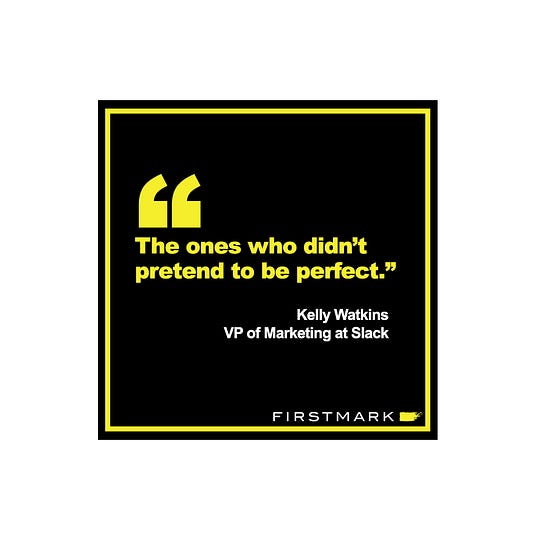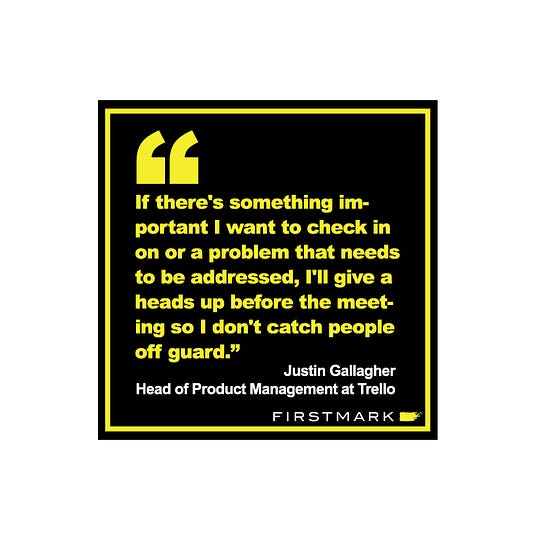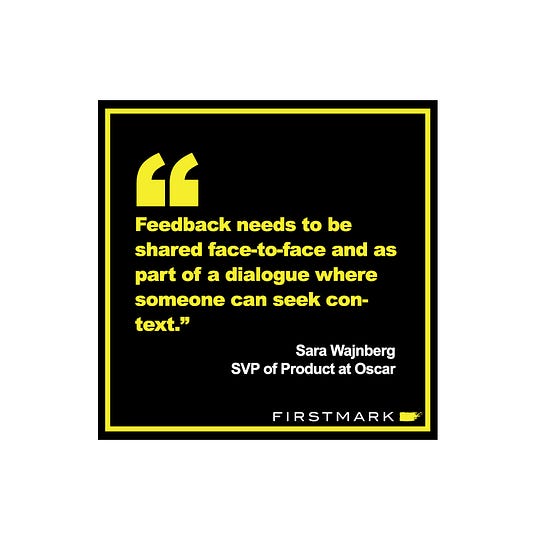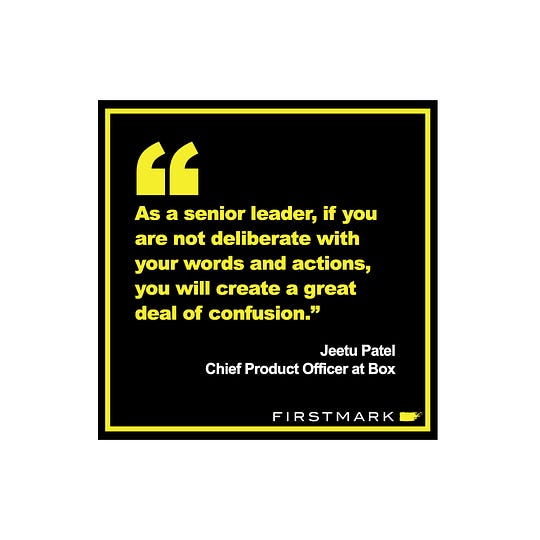The Comprehensive Guide for First-Time Managers
Jack Cohen / 12.01.18
Jack Cohen / 12.01.18
Managing people for the first time can be one of the most daunting yet rewarding challenges of your professional career. You’re no longer just responsible for yourself. Now, the productivity, progress, and actions of others ladder up to you.We wanted to help first-time managers best prepare themselves for this big step in their careers. That’s why, over the past few months, we’ve interviewed an incredible group of seasoned leaders in tech from breakout companies like Slack, Box, Oscar Health, Justworks, and others.This guide is a collection of their answers on how to be the best people managers and leaders possible.
* This is a living guide, and will be updated periodically. *
On Learnings From First Management Role
Clear the way so others can be successful
“My first managerial role came when I was promoted to a service supervisor from a waiter at Sizzler, and my job was to manage the other waiters during our shift. During this time, I realized that I could no longer argue to have the best section of the restaurant assigned to me, but rather as the manager, I had to provide the best section to the other waiters working that shift. The biggest lesson I learned, that I have carried with me throughout my career, is that being a leader isn’t about getting your way — it’s about clearing the way so others can be successful.” – Jeetu Patel, Chief Product Officer at Box
Leadership isn’t about the boxes and lines on an org chart
“I started my career as a software engineer at Amazon, where I worked on “third party payments” (3PP), the system that moved money between buyers and sellers on their marketplace. About three years in, I took on a project management role within the team. Even though no one reported to me on paper, I was in a position to lead the broader team to a successful outcome. That was the first time it really clicked that leadership isn’t about the boxes and lines on an org chart, but about following people that you trust and respect.” – Isaac Oates, Founder & CEO at Justworks
Manage expectations, build trust, and be humble
“My first management role was in consulting before I started working in tech & startups. It was a people and project manager role. I learned a ton about working with people — both those I was managing and also the clients we were working for. From that first role, I learned how to manage expectations, how to align the work we were doing with the strengths of individuals on the team, how to build trust, and how to be humble.” – Justin Gallagher, Head of Product Management at Trello
The importance of setting the tone for team
“I first started managing while working in Uganda in 2007. The organization I was with was based in the northern part of the country, which had experienced decades of civil unrest. This made for an intense environment that lacked basic infrastructure for getting programs off the ground.The biggest thing I learned during this time was how much leaders set the tone for their team, and how things can go off course when this isn’t done intentionally. Teams look to their leaders to calibrate their responses to stress, failure, and adversity, in addition to understanding what celebration looks like. This experience of managing in a fluid context gave me a more well-rounded sense of what management should be — that you can’t just set vision and direction; you also have to tune the emotional frequencies in which people work.” – Kelly Watkins, VP of Marketing at Slack
People management is very different from content leadership
“The first person I managed was a product management intern, and I remember how surprised I was by the amount of time I ended up having to spend with him. The biggest learning I had from that experience is that people management is very, very different from content leadership. Being a seasoned product person can easily translate into being a good product content lead, but good people management doesn’t necessarily come inherently and requires very different skills and training. Today, any time someone on my team expresses the desire to dabble in management, I make sure they understand that this is a very different function from what they’ve been doing, the switch doesn’t always work out for everyone, and it’s not the only path forward to growth — just to make sure they’re really ready for it.” – Sara Wajnberg, SVP of Product at Oscar
On Great Manager Qualities
Autonomy
“My favorite managers were the ones that gave me autonomy and provided direct feedback. This way, I always knew where I stood and what I needed to work on. Additionally, high integrity has always been a very important character trait to me — it was important to me that I knew that my manager had my back.” – Jeetu Patel, Chief Product Officer at Box
Care
“I’ve been very lucky to always have managers who cared a lot about the people working for them. I had friends who didn’t have the same experiences. Talking with them, I really grew to appreciate managers who always put their people first.” – Justin Gallagher, Head of Product Management at Trello
Being Human
“The managers that I’ve most respected and have learned the most from have always been the ones who didn’t pretend they were perfect. They admitted to not knowing answers, apologized for mistakes, and in doing so, invited others to be their partners in the work. There’s nothing more powerful than saying to someone, “I don’t know the answer, but let’s work together to find it.

I think there’s often a temptation to put on airs when in management and to withhold your shortcomings and feign credibility on any and all matters. People aren’t blind though, and they can tell when you’re bluffing or overstating what you know and what you’re capable of solving. Being human and vulnerable, on the other hand, is invitational and helps people feel like they can contribute to the direction in which you want things to go.” – Kelly Watkins, VP of Marketing at Slack
Advocacy
“The managers I most appreciated were the ones I felt had my back and would go to bat for me — help me out when I needed something to be more effective at my job (e.g., access to production data!) or had a conflict that I couldn’t resolve on my own. Lack of action for me bred mistrust and disillusionment, so those managers that took my frustrations and concerns seriously and actually did something about them were the ones I most wanted to work for.” – Sara Wajnberg, SVP of Product at Oscar
Relatability & Reliability
“My first manager at Amazon, Phil Wilson, really cared about me as a person. I was 22, fresh out of school and had just started as an engineer on the payments team. Phil would talk with me about his own career experiences and help me think through the challenges I was facing. I think the big lesson was that he could lead by asking questions rather than telling you what to do. He was really good at letting you draw your own conclusions but also getting you where he wanted. This is something I wish I was better at. It requires a lot of patience. He was much more like a coach or older brother in the support he gave and we’re still in touch to this day.” – Isaac Oates, Founder & CEO at Justworks
On 1-on-1’s
Clear hurdles, bring an agenda, and discuss bad news first
“I’ve made it clear to anyone who schedules 1-on-1 meetings with me that this is their time and it is up to them to set the agenda. My job is to clear any hurdles and make their life easier. And I tell them to bring me the bad news first.”- Jeetu Patel, Chief Product Officer at Box
Keep it casual, build relationships, and focus on listening
“I keep my 1-on-1s pretty casual and conversational. Our team is majority remote, so for me, these meetings are as much about building relationships as they are about checking in on projects, performance, and career aspirations.

In general, I try to be a good listener and let the other person talk more than I do. If there’s something important I want to check in on or a problem that needs to be addressed, I’ll give a heads up before the meeting so I don’t catch people off guard, and they have some time to prepare if needed.”- Justin Gallagher, Head of Product Management at Trello
Stay organized and discuss substantial content
“To keep things organized, I have a private Slack channel with each of my direct reports where we can both post agenda items to discuss in 1-on-1 meetings. Sometimes something can be solved more quickly in that channel, otherwise, we collate all the topics posted each week for in-person discussions.I view the 1-on-1 meeting itself as something that should be driven by my directs, as it’s their time and space to raise issues, whether those are about projects or career development. If I have things to discuss or raise, I always save those for the end of the meeting so that the other person has sufficient time for anything that’s on their mind. I also prefer that 1-one-1 meetings be used for more substantial conversations, rather than status updates, as the dedicated time each week is the best opportunity to go deep into topics.On additional tool that I’ve found incredibly valuable is Lara Hogan’s list of questions for a first 1-on-1. This information is incredibly valuable to have on hand for the people you work with, as it can guide how you best manage someone and help them thrive. I encourage all managers on my team to ask these questions in their first 1-on-1’s, and we have set up a custom profile field in Slack that lists each person’s favorite dessert.” – Kelly Watkins, VP of Marketing at Slack
Prioritize real-time, get out of the office, talk career goals
“My approach to 1-on-1’s is pretty personal, starting from the amount of time and cadence — I try to let my reports figure out what amount of time they want from me and how often we should meet, and adjust as needed as time goes on. For frequency, it varies: Sometimes it’s twice a week for 30 minutes each time (one tactical, one career-oriented ), sometimes it’s once a week for a 30-minutes, and sometimes it’s once a week for an hour, etc.The agenda covers (1) what does the person need from me, (2) what issues are they dealing with that I can help them resolve, (3) what topics are brewing that I should be helping get ahead of, (4) what information do I need to give them to help them be more successful, etc.We real-time prioritize the topics (because time is always more limited than you think!) and I keep close tracks of follow-ups expected from each of us so we can make sure we take action afterward. I also like to occasionally get out of the office into more informal settings to pull up and discuss how things are going and how they’re feeling about their time and trajectory with the company.” – Sara Wajnberg, SVP of Product at Oscar
Don’t overdo it
“I like to review the goals that we’ve set together, discuss if any changes are appropriate, and then exchange feedback. I have 30 minutes per month with each of my direct reports, so most of our substantive discussion happens in group meetings rather than 1:1. That’s intentional — I think group meetings are helpful in building shared consciousness and minimizing politics.”- Isaac Oates, Founder & CEO at Justworks
On Giving Effective Feedback
Early, often, and lead with details
“Giving feedback early and often is one of the most important things you can do as a manager, including both positive feedback about the things someone is doing well, and constructive feedback about areas where someone can improve. However, I often see first-time managers shy away from giving direct feedback out of a fear of not being liked or a concern over hurting someone’s feelings. Avoiding hard conversations ultimately harms the relationships between a manager and their direct reports, so I encourage first-time managers to master *how* to give feedback, as the way in which it is delivered has the biggest impact on how it will be received.

Some “hows” that I think matter most: feedback needs to be shared face-to-face and as part of a dialogue where someone can seek context. After giving feedback, it’s critical to ask clarifying questions like, “What do you hear me saying?” and “How can I best support you as you work through this feedback?” Following up the meeting with the feedback in writing can help someone accurately internalize and reflect on what you said. It’s also important to specify what you expect someone to do next, whether that’s coming up with a plan or making a change by a clear date.One additional piece of advice I would add is that when giving feedback, it’s important to lead with details about why the feedback is being given in the first place. If someone can understand what’s motivating your feedback, they can better know what to do when you give it.” – Sara Wajnberg, SVP of Product at Oscar
Give it time
“Giving effective feedback is difficult but it gets easier with time. I think this is probably the #1 management challenge for many people, including very senior and experienced leaders. Just keep working on it.” – Isaac Oates, Founder & CEO at Justworks
On Important Habits To Form
Use your org chart as a mental touch base
“One thing I have found invaluable is to regularly pull up my org chart and go through every individual in my mind to make sure they’re getting what they need from me/my reports, that I know where they stand and what we’re working on to develop them, and that I have a good read on how they’re feeling. That continuous mental touch base often allows me to get ahead of things before they start burning.” – Sara Wajnberg, SVP of Product at Oscar
Communicate your preferred communication method
“I am terrible at responding to email and learned early on that people get frustrated if they can’t get a hold of you. But, I realized that text messages work much better for me and am always responsive on text — so, people who really need me can always get a hold of me this way.Recently, I have also instituted another habit for the purpose of always being available to people that matter. Whenever my seven-year-old daughter calls me, I answer no matter what meeting I am in — this way she knows that her dad is only ever just a phone call away.” – Jeetu Patel, Chief Product Officer at Box
Identify an actionable next step for every to-do item
“To make sure I’m prepared for the day ahead, I spend a few minutes every morning on the train going through the items in my “Today” list to make sure they all have an actionable next step. This helps me keep up the momentum so I don’t get bogged down by big, overwhelming projects. For meetings and 1:1s, this exercise ensures that I go into every conversation with at least some forethought and preparation so I can make the most out of that time.” – Justin Gallagher, Head of Product Management at Trello
Sort tasks into groups to increase your operating tempo
“Whether it’s on paper, on a spreadsheet, or in my inbox, sorting tasks into different groups and then attacking them together head-on has helped me be more productive. Recently, for example, I set up some filters in my email account that separate messages that demand a response from everything else. That might seem small, but it’s changes in habit like this that have helped me be much more responsive to the people I work with. It’s made a surprisingly large difference in our operating tempo. I also take time on Sundays to draft emails to send out on Monday morning. It helps me catch up on my inbox without also dumping work on my team over the weekend.” – Isaac Oates, Founder & CEO at Justworks
On Changing Team Members’ Behavior
Ask lots of questions
“I have a well-earned reputation for asking a ton of questions. Sometimes this makes people who aren’t used to working with me feel as though I’m questioning how prepared they are or whether they’ve thought through something fully, but I am usually just genuinely curious and feel as though I can’t really weigh in on something if I don’t adequately understand it. Asking lots of questions often reveals that someone has made assumptions they still need to validate, or that they don’t have the answer to something that probably will be asked of them. My goal in doing this, beyond improving my own understanding, is to help people learn how to get the full picture of a problem before forming an opinion or designing a solution, and I do think that this style of interaction helps train people to do that more naturally. I apply the same methods when talking about less tactical things like cultural concerns or questions about career pathing; asking lots of questions allows someone to sort through and better understand their own thinking, as well as consider other perspectives.” – Sara Wajnberg, SVP of Product at Oscar
On Top Advice From Coaches & Mentors
Be deliberate about your words & actions to avoid confusion
“I have had several coaches and mentors throughout my career, but the coach that I had during my time as CEO of Syncplicity was incredibly helpful. This coach helped me to see the importance of self-awareness and how, as a senior leader, if you are not deliberate with your words and actions, you will create a great deal of confusion. People hang on to every word you say — even when you are just thinking out loud. This coach instilled in me, not only the importance of being aware of the words I am using, but ensuring I’m providing my teams with the clear direction they need to be successful.” – Jeetu Patel, Chief Product Officer at Box

Be cognizant of insecurities that can block your career progress
“I haven’t worked with a formal professional coach, but we do have a function at Oscar called People Strategy (similar to the role of a traditional HR business partner, but even more expansive), and I am paired with someone that is essentially a coach who has had a huge impact on my thinking and on my career development. The biggest lesson I have learned from working with her is that I have subconscious mental blocks and insecurities that prevent me from proactively stepping up to take on broader roles and responsibilities. Each time I’ve progressed roles and become more senior it’s taken months to build up my confidence and get myself into the right mindset, but it’s definitely getting easier the more I’ve internalized and recognized that this is a gap that I have to work extra hard to overcome and that I usually do just fine after I’ve gotten over the mental hump!”- Sara Wajnberg, SVP of Product at Oscar
On Delegation
“I’ve been fortunate to hire and work with some extremely talented people at Justworks, who are much better at most things than I am. That makes it easy to delegate. That said, if I’m still getting comfortable with their work style or it’s a high-risk project then I ask to stay involved as it progresses. Some things I’ll always stay closely involved in, for example, activities that impact or send messages about our culture like promotions to leadership roles and company-wide events.” – Isaac Oates, Founder & CEO at Justworks
On What They’re Working On Now
Workplace Diversity
“Diversity in the workplace is an area I feel passionately about, especially working on getting more women in technology, across all functions. I truly believe that teams perform better in an environment where there is a diversity of backgrounds, beliefs, and where employees feel like they belong.” – Jeetu Patel, Chief Product Officer at Box
Communication at Scale
“When an organization scales, a leader has to transition from doing the work to getting things done. This isn’t an easy switch for many leaders or their teams, however. Leaders have so much more context about the work given the information they have access to, and they also have opinions on how the work happens and what quality and craftsmanship in execution look like (or at least I do!).I’ve been thinking about this transition a lot lately and seeking to find ways that I can best equip my team to do their jobs. As a result, I’ve been working on building a structured onboarding program so that everyone who is new has a chance to understand what we do, what we expect, and how to be successful in marketing at Slack. I’ve also been working on how to consistently communicate information out, developing a weekly newsletter/wrap up that I share on Fridays. It covers everything from what’s top of mind and what’s inspiring me to upcoming hires and important dates. Being intentional about sharing this information in a way that everyone has access to helps me move information from my brain into the organization.” – Kelly Watkins, VP of Marketing at Slack
Long-Term Vision vs. Short-Term Action
“One thing I’m working on now is helping the team achieve a better balance between long-term vision brainstorming and articulation vs. day-to-day execution against our nearer term objectives. We are doing a lot, and sometimes it feels as though there isn’t enough time to think far ahead. We’ve already put some mechanisms in place to help get us in the right mindset (such as healthcare tech strategy sessions every few weeks, regular strategy offsites, newsletters we all subscribe to, etc.) but we still have a lot of work to do to achieve a healthier balance between the now and the future.”- Sara Wajnberg, SVP of Product at Oscar
Is there someone who you really admire as a leader (not at your current company) that you think would enjoy being interviewed? Let us know by sending their name and short description to jack@firstmarkcap.com.
Next